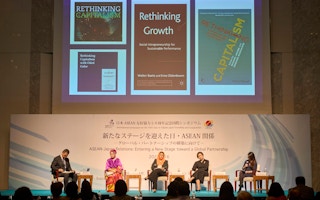In 1967, when Southeast Asian nations came together to form the Association of Southeast Asian Nations (Asean), Japan was the first country in the world to build official ties with the regional bloc as a “dialogue partner”.
To continue reading, subscribe to Eco‑Business.
There's something for everyone. We offer a range of subscription plans.
- Access our stories and receive our Insights Weekly newsletter with the free EB Member plan.
- Unlock unlimited access to our content and archive with EB Circle.
- Publish your content with EB Premium.
What is lesser known is the fact that this was initiated amid high diplomatic tensions. Japan’s rapid economic penetration of Southeast Asia unsettled the region, triggering boycotts and protests. In particular, Japan’s synthetic rubber industry was disrupting the trades of Asean’s natural rubber exports — a major economic activity at that time.
The first forum between the two parties was held in 1973 to discuss the pressing issues, and official relations were later cemented in the Fukuda Doctrine of 1977.
Japan’s then-Prime Minister Yasuo Fukuda pledged that the country, committed to peace, would never become a military power and that Japan would build up a relationship of mutual confidence and trust with Southeast Asian countries in wide-ranging fields.
Relations between the two evolved from a state of war to reconciliation and normalisation; to unequal cooperation and then finally to cooperation between strategic partners.
Fifty years on, Japan and Asean have much to celebrate in terms of its achievements and progress. Japan remains a key trade and investment partner to Asean: two-way trade between them reached US$240 billion in 2021, placing Japan as Asean’s third largest trading partner.
Japan was also ASEAN’s fourth largest external source of foreign direct investment among its dialogue partners.
In celebrating 50 years of friendship, the Japan Foundation and the Ministry of Foreign Affairs of Japan recently hosted the Japan-Asean international symposium themed ‘Entering a New Stage toward a Global Partnership’ in Tokyo.
Prime Minister Kishida Fumio, delivering a message to the forum, highlighted the importance of discussing issues including “peace and stability in the Indo-Pacific region and the entire world, the realisation of sustainable and prosperous societies, and building mutual understanding and trust among people”.
The current fragmented and volatile geopolitical situation was top of mind for the Asean and Japanese leaders who gathered at the forum, attended by some 100 in person and hundreds more virtually. Questions posed to diplomats, policymakers and business leaders focused on the society humanity wants to achieve in the next 50 years, and how we will overcome societal challenges in the latter half of the century.
Speaking on one of the panels themed “Towards a sustainable and prosperous society”, I highlighted five priorities for Japan-Asean cooperation.
1. Demilitarisation
We do not need more wars. They must be avoided at all costs.
Recent heightened tensions in the wake of Russia’s continued invasion of Ukraine has prompted United Nations Secretary-General António Guterres to declare at the recent Davos meeting that “we are in the worst situation of my lifetime”.
Growing friction between the US and China are prompting fears of a new Cold War, and military spending across the world has soared to record levels, including Japan’s. While many nations view such spending as preparation to deter war, the risk is that others are likely to view it as provocation.
Furthermore, of concern is the rising incidence of pro-war rhetoric, as seen in an alarming ‘Red Alert’ series of stories by Australia’s major newspapers The Sydney Morning Herald and The Age in which stories with the headline: “Australia faces the threat of war with China within three years – and we’re not ready” were published.
Japan and Asean are key players that can de-escalate tensions, especially in this region, not fuel it. In the week prior to this forum, the 16th Japan-Singapore Symposium hosted in Singapore saw both governments affirming that they “should build on existing economic and security ties, especially given the rising tensions in an unpredictable geopolitical environment”. In an era of high diplomatic tensions and misinformation, there is a huge role Japan and Asean can play in shaping the constructive and positive narratives that encourage open dialogue instead of mistrust.
2. The energy transition
While Russia wages an unjusitified war on Ukraine, the climate crisis marches on. As governments spend unprecedented amounts of money on the military, the war chest for climate mitigtation and adaptation is falling short .
The climate crisis will only be resolved with a global energy transition towards zero or low carbon energy systems and this single, most profound economic transformation we are going through today requires an incredibly large scale of change in a very narrow window of time.
We need governments to boldly legislate and create policy frameworks in which this transition is adequately financed, carbon is correctly priced and regulated, the right signals and incentives are provided for businesses, and communities affected by transition plans are engaged.
In Asean, many developing economies are still driving their development agenda to address poverty and energy security. The “just and equitable” transition has now emerged as a key approach to ensure that wider metrics than “tonnes of carbon emissions removed” are used to measure progress.
The Just Energy Transition Partnership (JETP) for Indonesia launched at last year’s G20 summit in Bali with the support of countries such as the US and Japan is heralded as a much-needed policy approach to help developing countries speed up their energy transition.
While the jury is still out on how the partnership will be executed on the ground and if outcomes outlined will be achieved, it would be useful to continue refining these partnerships; case studies should also be documented and shared so as to replicate success in the rest of developing Asean. Japan is also home the world’s largest green hydrogen plant and there is huge potential for knowledge sharing and technology transfer between Japan and Asean countries.
“
We need governments to boldly legislate and create policy frameworks in which this transition is adequately financed, carbon is correctly priced and regulated, the right signals and incentives are provided for businesses, and communities affected by transition plans are engaged.
3. Gender and income inequality
In Asean, despite the rapid economic growth of recent decades, income distribution and inequality has been worsening; while Japan has been widely regarded to be less unequal, it has also been struggling with similar issues in recent years.
Measures such as wealth redistribution, female labour force participation rate, productivity growth and digitalisation, according to an IMF study, could help to significantly accelerate inclusive growth for both Asean and Japan.
In Singapore, for example, the city-state recently achieved the target of 30 per cent female board directors on the top 100 listed corporate boards and a relatively higher rate of 66 per cent female participation in the labour workforce. All across the region, these rates are uneven and need to be significantly increased — particulary in Japan — and data shows female participation and representation in leadership roles lead to better societal outcomes.
4. Responsible consumption and production
Many of our natural ecosystems are at dangerous tipping points. We often overlook how nature provides services worth at least US$125 trillion per year globally, providing all that we need and facilitating global trade and livelihoods for billions of people.
One increasingly popular metric, Earth Overshoot Day — which marks the date when humanity has used all the biological resources that Earth regenerates during the entire year — falls earlier each year. Last year, Earth Overshoot Day fell on 28 July.
At the same time, we are facing a huge resource challenge. Technology has enabled wonderful advancements that now infiltrate and improve our daily lives, but it has also enabled mankind to exploit the Earth’s resources at a massive, unprecendented scale — with consequences that we barely understand.
Taking plastic as one example, its excessive production and consumption has resulted in the mass pollution of many of our ecosystems such as waterways in developing Asean, and it’s now affecting human health, found even in our bloodstreams. It has prompted the United Nations to begin negotiations for a global plastics treaty that will for the first time legislate the use of this resource.
As with the energy transition, we will require bold legislation to safeguard the use of natural resources. We need policies to regulate the safe and sustainable extraction of the minerals required for the energy transition and the goods we manufacture for human living; and for its effective collection, management and re-use so that we can enable a truly global circular economy.
We need citizens to support the right policymakers and political office holders to enact the right laws that will compel businesses into the required investments and actions. We need to tap on the emerging waves of digitalisation — such as artificial intelligence and machine learning — but we also need strong governance frameworks to guide their use and outcomes. Japan and Asean countries can show leadership in this area.
“
We urgently need a re-definition of growth and capitalism and to create a new set of metrics that are fit for purpose in this century.
5. Re-defining growth and capitalism
Finally, it has been three centuries since Adam Smith’s 1776 book, “The Wealth of Nations” defined gross domestic product (GDP) — the monetary value of final goods and services produced in a country in a given period of time — and provided the foundation for classical economics and capitalism. We urgently need a re-definition of these terms and to create a new set of metrics that are fit for purpose in this century.
We are beginning to see encouraging conversations happening on the international stage, such as the European Parliament’s Beyond Growth 2023 conference which is aimed at “challenging conventional policy-making in the European Union and to redefine societal goals across the board”.
We need one not just for Asean-Japan too, but the world. The United Nations’ Sustainable Development Goals (SDGs) adopted by all nations in 2015 somewhat provides a framework for a development model that is more suited for our era, (and interestingly, Japan seems to have embraced the SDGs more visibly than any other nation) but to a large extent, this has yet to percolate through the financial centres of the world which are premised on and still idolise the doctrine of profit maximination for shareholders.
While we acknowledge that capitalism as an economic model has lifted billions of people out of poverty, it is also rife with flaws, emboldens short-termism and rewards exploitation. The rise of “stakeholder capitalism“, which prioritises all stakeholders rather than only shareholders, and the rising global importance of environmental, social and governance (ESG)-based decision-making in finance, is a welcome start in re-defining what we think the role of business is.
At this crossroads of 50 years, Asean and Japan have much to celebrate as a region, but we have much more to do to protect our shared history and our common humanity, and we would do well to remember that we can only achieve this with more cooperation, not less — or in Japanese, 一緒に働いている.











